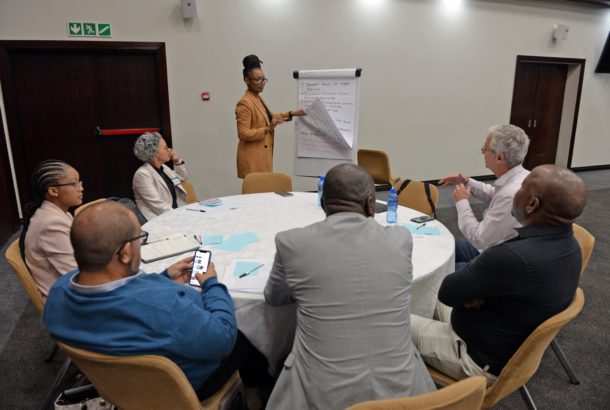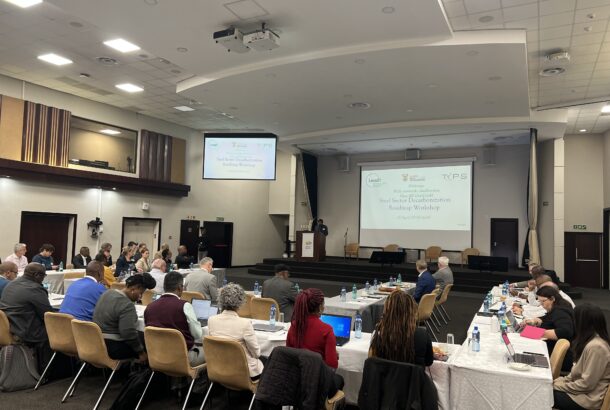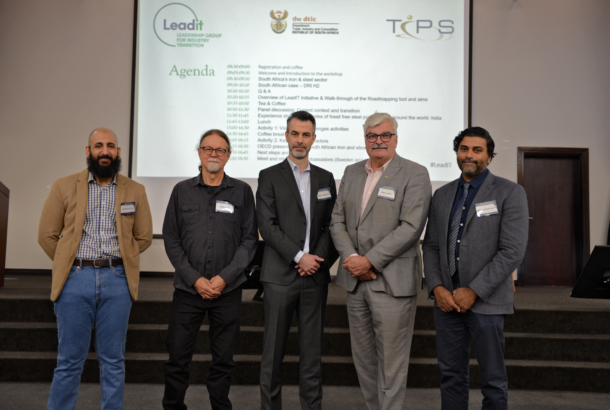Green steel transition in South Africa: insights from decarbonization workshop.
Earlier this year, the Leadership Group for Industry Transition (LeadIT) and Trade & Industrial Policy Strategies (TIPS) organized a workshop, hosted by the South African government, to advance the development of a national roadmap for decarbonizing South Africa’s steel industry. The workshop brought together more than 40 decision-makers and experts from industry, government, academia, and civil society.
The workshop supported the development of national-level plans, including the Steel and Metal Fabrication Master Plan, which states that the South African iron and steel value chain is to achieve carbon neutrality by 2050.
Because of increasing climate change risks and a changing global and local policy environment the global steel sector is at a crossroads, and data from the LeadIT Green Steel Tracker shows that the transition away from emission-intensive steel production has already begun. But to meet climate targets and avoid the risk of stranded assets, massive investments in low-carbon steelmaking technologies are needed.

Group discussion at the South Africa steel decarbonization workshop. Photo credit: Zuko Ntshidi, The Artrepreneur
Three priorities
At the workshop, three priority areas were identified as central to a green steel transition in South Africa.
1. Realizing South Africa’s potential competitive edge in green steel production
Hilton Trollip, University of Cape Town Research Fellow and a keynote speaker at the workshop, argued that South Africa’s position as a top iron ore producer, combined with its rich renewable energy resources, places it in a prime position to be a leader in the green steel transition. Innovations like green hydrogen direct reduced iron (GH-DRI) technology were identified as a potential game-changer in producing green iron ore for global export, primarily to Europe.
This rising opportunity is in line with the government of South Africa’s climate ambitions. Mahendra Shunmoogam, Director at the Department of Trade, Industry, and Competition, South Africa, told stakeholders at the workshop that, “Joining the Leadership Group for Industry Transition in 2022 was a logical fit to South Africa’s goals as our industry will have to re-orient itself towards the green industry future. Green processing and production are likely to become a significant competitive advantage, especially in the export market”.
2. Improving the business case and building skills for a just and equitable transition
Workshop participants said that international climate finance is critical for making industrial transitions viable and fairer. At the national level, public procurement of green steel and the build-out of renewable energy infrastructure was mentioned as key to creating a business case for green steel investments. Participants also highlighted the pressing need for more public-private partnerships to develop technological readiness for low-carbon production and educate workers to transition to the new industry. Industry participants also asked for a “one-stop shop” to support companies in managing the myriad regulatory and incentives issues that will arise as the sector implements the transition, in areas like land and environmental permitting, energy markets, infrastructure, piloting, and demonstration.
3. Build-out of fossil-free energy
The steel industry is one of the world’s most energy-intensive sectors and South Africa’s unstable power grid is currently a major obstacle to achieving low-carbon steel production. Participants stressed the urgent need for policy development and cross-sectoral collaboration to decarbonize the power sector. Participants from civil society emphasized that such efforts need to ensure that a transition to green steel not only benefits the industry but also enhances grid reliability for the entire population.
Green processing and production are likely to become a significant competitive advantage, especially in the export market.
Mahendra Shunmoogam
Director, Department of Trade, Industry, and Competition, South Africa.

Mahendra Shunmoogan, Director, Department of Trade, Industry and Competition, South Africa, speaking at the South Africa steel decarbonization workshop. Photo credit: Zuko Ntshidi, The Artrepreneur
Action and next steps
The Steel Decarbonization Workshop in South Africa was based on the key principles of the LeadIT Industry Transition Roadmap Planner – a tool developed to support decision-makers in the public and private sectors in designing, developing, and implementing decarbonization roadmaps for industry sectors. Participants highlighted that a national decarbonization roadmap for South Africa’s steel sector is a critical step in the transition to a low-carbon iron and steel value chain, and that the transition should create new job opportunities in renewable energy, clean technology manufacturing, and related sectors.
Lufuno Maliaga, Analyst at the South African Iron and Steel Institute (SAISI), a non-governmental organization serving the interests of the steelmaking industry in South Africa, said, “The phase of transition needs to be carefully managed through policy intervention, in particular government creating an environment for business to transition swiftly to manage the process in a manner that is overall positive socio-economically. A South Africa Roadmap will be critical for this.”
The results of the Steel Decarbonization Workshop will be taken forward by the South African government, and by the OECD, which is organizing a series of stakeholder events in 2023 and 2024. The events aim to identify technologies, projects, and case studies consistent with net-zero pathways, to validate decarbonization business cases, and discuss market and finance solutions that could improve the viability of business cases.
Joseph Cordonnier, Clean Energy Finance and Investment Policy Analyst at the OECD, said that the workshop offered foundational perspectives for future OECD workshops focused on South Africa’s steel industry: “My main takeaway from the workshop is a better understanding of the domestic context to begin a process of chartering a sustainable way forward for the steel sector value chain in South Africa. This includes in particular the absence of a domestic market for green steel products as most customers’ purchasing decisions are driven by costs, the low reliability of the power supply and power grid, and the up-skilling requirements.”
Learn more about key takeaways from the Steel Decarbonization Workshop in LeadIT Steel decarbonization workshop brief.
A full report from the workshop will be published by Trade & Industrial Policy Strategies
The phase of transition needs to be carefully managed through policy intervention, in particular government creating an environment for business to transition swiftly to manage the process in a manner that is overall positive socio-economically
Lufuno Maliaga
Analyst, South African Iron and Steel Institute (SAISI)

Keynote speakers: Mr. Muhammed Patel, Trade & Industrial Policy Strategies (TIPS) Senior Economist, Mr. Hilton Trollip, Research Fellow at University of Cape Town, Dr. Aaron Maltais, LeadIT Secretariat at Stockholm Environment Institute (SEI), Håkan Juholt, Swedish Ambassador, South Africa, Mahendra Shunmoogam, Director, Department of Trade, Industry and Competition, (DTIC) South Africa. Photo credit: Zuko Ntshidi, The Artrepreneur
The Leadership Group for Industry Transition (LeadIT) gathers countries and companies that are committed to reaching net zero carbon emissions from industry by 2050. SEI serves as LeadIT’s Secretariat. South Africa became a member in 2022.
